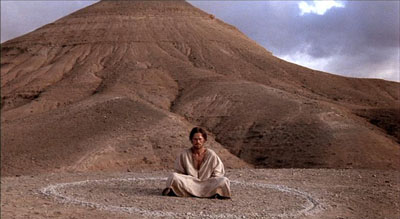Jesus
lived with his mother Mary and his adoptive father Joseph and he grew to be a
good man. He had a good reputation with
everyone and he increased in wisdom.
Above all else, he desired that God’s will be accomplished. He obeyed his parents and God’s command in
everything he did. And he studied God’s
word to know what God’s will was.
But Jesus also saw that God’s will was not being
accomplished on earth. He saw God’s
people disobeying God in important areas.
And he saw that God had made many promises that were not yet
fulfilled—God’s spirit had not yet descended upon his people to cause them to
do His will; a righteous king had not been chosen to lead his people and to
bring justice; God’s people still suffered in need. God’s will was not accomplished. And Jesus determined to do all he could to
change that.
John
the Baptist was a powerful man of God.
He lived in the wilderness at the Jordan River, eating wild honey and
locusts. He wore rough clothing and
preached. Perhaps at first he preached
to the twigs and flowing river, but soon he had many people listening to
him. He told them to repent, for God’s
promises were going to be fulfilled.
“God is going to quickly judge his people—get ready for it! You are all doing wicked deeds—change your
ways and God will forgive you!”
Those who committed themselves to repent John
brought to the Jordan river and led them
across it. He was reenacting the
crossing of the Jordan and
of the Red Sea long ago. If they were going to repent, they needed to
be swallowed by the destructive water and be made alive again by God. In this way, God was making a new people, a
new generation that would be obedient to him.
Jesus came to John in order to be led across the Jordan Jordan
Just as Jesus was baptized, a revelation from the
spirit world came upon him. The Holy
Spirit came upon Jesus in the form of a dove, and filled Jesus. And the voice of God came from heaven, saying
to Jesus, “You are my son, whom I love, the king of my people. I am pleased with you.” No one heard this but Jesus and John and the
powers of the spirit world. They all
knew that Jesus was selected by God to lead God’s new people.
Immediately after this, Jesus left the Jordan
Satan was determined to cause Jesus to disobey God,
so he said, “So you are the king of God’s people. But who is going to
acknowledge you? Certainly no one will
pay attention to you. Let me help
you.” Satan transported Jesus to the
very top of the temple in Jerusalem Jerusalem
Satan was running out of ideas. So he said to Jesus, “Here, let me show you
something.” And he showed Jesus all of
the great nations of the world—the civilizations of India ,
China , the Aztecs, the Huns
and powerful Rome
After Jesus gained his strength back, he began to
visit synagogues in Galilee . Every time he visited a synagogue, he was
given an opportunity to tell news or to say something of significance. Jesus stood in front of each synagogue and
proclaimed, “God’s government is coming!
Get ready for God’ revolution.
Repent from your sins. Obey God. And be faithful to God’s victory that is
coming soon.”
From Luke 3-4, Matthew 3-4 and Mark 1








